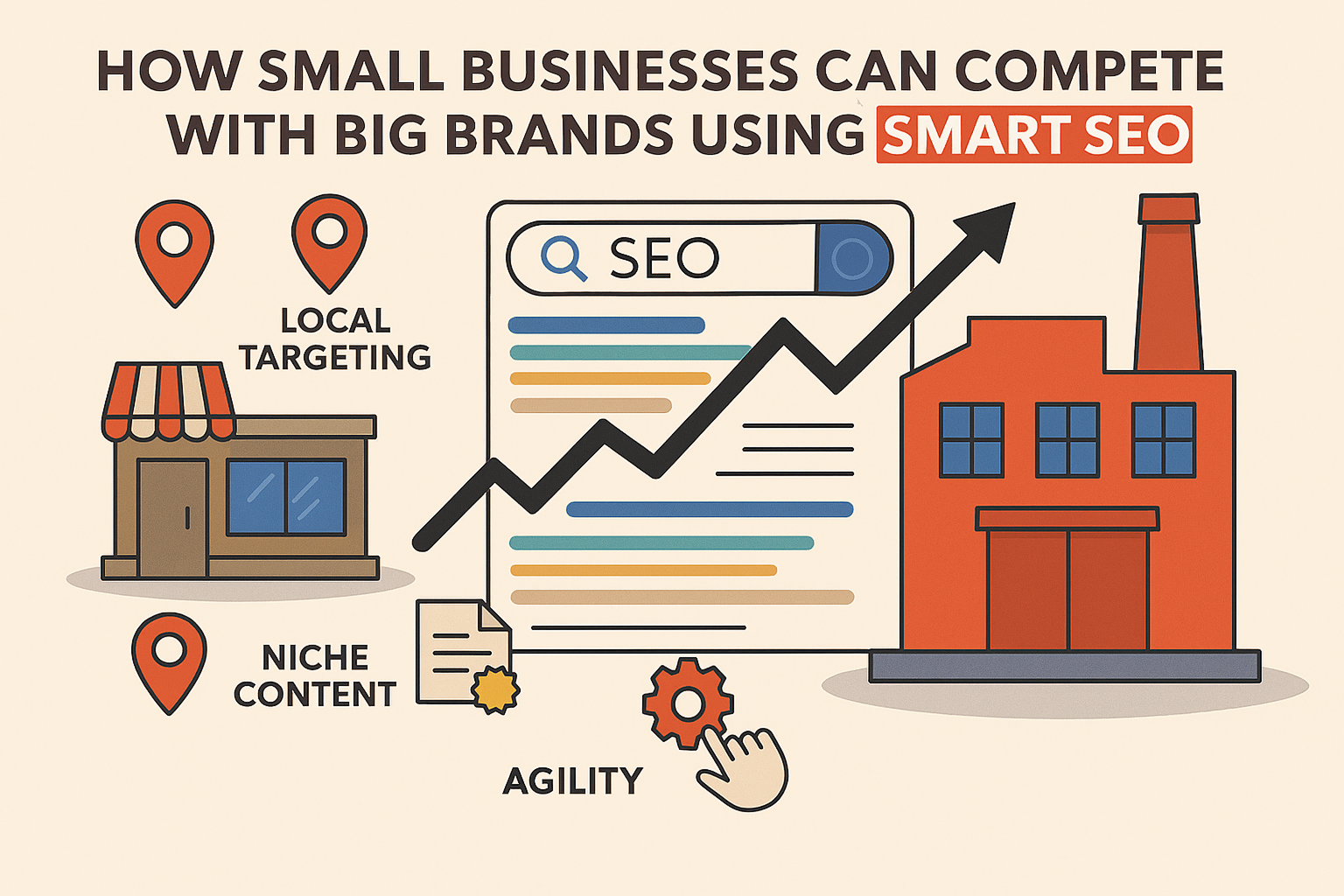Contents :
- 1. 5 Ways Marketing Automation
- 2. Using Real-Time Personalization to Make an Instant Connection
- 3. How Marketing Automation Works and Why It Saves Time
- 4. How to Improve Marketing ROI with Smarter Strategies
- 5. AI Automation and Lead Nurturing: Do More with Less
- 6. How Automation Can Help You Save Time and Grow Faster
Kumaresan S
How Small Businesses Can Compete with Big Brands Using Smart SEO

The digital marketing landscape might seem intimidating when you’re a small business owner facing corporate giants with million-dollar marketing budgets. However, here’s the reality: transforming business in 2025 means SEO has fundamentally changed the rules of the game. Smart SEO strategies now enable small businesses to outrank Fortune 500 companies, capture high-intent customers, and build sustainable online visibility without breaking the bank.
This transformation isn’t just a theory; it’s happening daily across industries. Local bakeries outrank national chains for wedding cake searches. Independent contractors appear above major corporations for emergency services. Small professional practices dominate their markets while big firms struggle with generic, corporate content that fails to connect with local audiences.
Why SEO Levels the Playing Field for Small Businesses
Unlike traditional advertising, where the highest bidder wins, SEO rewards relevance, quality, and user experience above all else. The statistics tell a compelling story: 75% of users never scroll past the first page of search results, local searches have 50% higher purchase intent than generic searches, and small businesses investing in SEO see an average 14.6% conversion rate compared to just 1.7% for traditional outbound marketing methods.
As a small business, you possess natural advantages that big brands can’t replicate: you can move fast, speak directly to your audience, and optimise for specific local needs that corporate competitors simply can’t match.
“Ready to see how your business can outmaneuver bigger competitors? Let’s map out your SEO strategy “
The Strategic Foundation Every Small Business Needs
Building successful SEO starts with understanding that you’re not trying to beat big brands at their own game; you’re playing by different, smarter rules. Your first month should focus on building a solid foundation through a comprehensive assessment and strategic setup.
Begin with a complete technical SEO audit using free tools like Google Search Console, Google Analytics 4, Google Keyword Planner, and PageSpeed Insights. Your competitive analysis should identify your top five local competitors, analyse their target keywords, study their content strategy to identify gaps, and examine their Google Business Profile optimisation levels.
Technical optimisation requires ensuring mobile optimisation since 60% of searches happen on mobile devices, improving page speed to under three seconds, installing an SSL certificate, creating an XML sitemap, and setting up proper site navigation.
Mastering the Long-Tail Keyword Advantage
While big brands fight expensive battles over broad keywords like “insurance” or “restaurants,” your goldmine lies in long-tail, high-intent keywords that corporate competitors ignore. These longer, more specific phrases represent customers who know exactly what they want and are ready to buy.
The winning formula combines your service with location and specific modifiers. Instead of competing for “plumber,” you target “emergency plumber downtown Chicago Sunday.” Rather than fighting for “wedding cakes,” you dominate “organic wedding cakes northern Virginia.”
Long-tail keywords offer multiple advantages: lower competition, making them easier to rank for, higher intent traffic since specific searches convert better, and a natural focus on local markets where you can realistically compete and win.
Dominating Local Search Through Strategic Optimisation
Local SEO represents your most significant competitive advantage over national brands. Your Google Business Profile becomes your most powerful free marketing tool when properly optimised.
Visual content strategy plays a crucial role in local SEO success. Upload high-quality exterior and interior photos, include team photos that humanise your brand, display product or service photos, and commit to regular photo updates at least weekly.
Customer engagement requires responding to all reviews within 24 hours, posting weekly Google Business updates, answering customer questions promptly, and sharing special offers that drive traffic and sales.
Essential local citations include Google Business Profile, Bing Places, Apple Maps Connect, Facebook Business Page, and Yelp Business. Industry-specific directories, local chamber of commerce listings, and Better Business Bureau profiles further establish your local presence.
“Own your local search results before your competitors do.
Creating Content That Converts Local Customers
Content marketing becomes exponentially more powerful when you focus on local expertise, personal stories, and direct customer relationships. Your advantages include intimate community knowledge, real faces behind the business, and direct customer feedback informing your content strategy.
Local resource pages establish incredible authority and attract valuable backlinks. Create comprehensive guides like “Complete Guide to Wedding Planning in Melbourne, Australia,” including best venues, vendor directories, timeline considerations, budget planning, and legal requirements.
Problem-solution blog posts address specific customer pain points. Focus on common industry problems, provide step-by-step solutions, share before-and-after case studies, and create troubleshooting guides that establish expertise.
Behind-the-scenes content humanises your brand in ways corporations cannot match. Share team spotlights, day-in-the-life content, your business origin story, and community involvement activities.
AI-Powered SEO: The Future of Small Business Competition
AI Optimisation (AIO) has transformed search engines, creating opportunities for small businesses to compete with larger brands. Google’s AI Overview, Bing’s Copilot, and ChatGPT now present chances for small businesses to appear in AI-generated responses, bypassing traditional ranking competition.
Unlike conventional SEO that focuses on keywords, AIO emphasises conversational content and semantic understanding. Small businesses can leverage this by creating clear, authoritative content that directly answers customer questions in natural language.
Building Authority Through Strategic Local Link Building
Link building for small businesses should focus on cost-effective, local opportunities. Target local chamber websites, community directories, and neighbourhood blogs that your customers actually use.
Guest articles in local publications and community newsletters offer affordable expert positioning. Community involvement through local events, partnerships, and charitable activities creates sustainable links while building genuine business relationships that generate both search authority and customer referrals.
Advanced Strategies and Beyond
Voice search optimisation becomes crucial as 40% of homes have smart speakers and voice searches grow 35% annually. Create FAQ-style content answering conversational queries, optimise for featured snippets, and focus on clear, concise answers.
AI integration offers opportunities for content personalisation based on user location, service recommendations, and local market customisation. Use predictive SEO to identify trending keywords and optimise for seasonal patterns.
E-E-A-T optimisation (Experience, Expertise, Authoritativeness, Trustworthiness) requires demonstrating first-hand experience through testimonials and case studies, showing expertise through certifications and educational content, building authority through media mentions and awards, and establishing trust through professional website design and clear contact information.
“Want these strategies implemented without guesswork?
Conclusion
Smart SEO isn’t about outspending competitors; it’s about outmaneuvering them with strategy, local expertise, and consistent execution. Your competitive advantage starts with immediate action. Begin with the strategic foundation assessment, focus on long-tail keywords your competitors ignore, dominate local search through optimised Google Business Profiles, and build authority through cost-effective local link building. The businesses that act quickly on these proven strategies often maintain market leadership for years because early SEO success creates compound growth that becomes increasingly difficult for competitors to overcome.
Remember, every large corporation started as a small business. With smart SEO implementation, you’re not just competing with big brands, you’re positioning yourself to become the dominant local market leader in your industry.
“Don’t wait for big brands to push you out of search.
Share :
Kumaresan S
Contents :
- 1. 5 Ways Marketing Automation
- 2. Using Real-Time Personalization to Make an Instant Connection
- 3. How Marketing Automation Works and Why It Saves Time
- 4. How to Improve Marketing ROI with Smarter Strategies
- 5. AI Automation and Lead Nurturing: Do More with Less
- 6. How Automation Can Help You Save Time and Grow Faster
